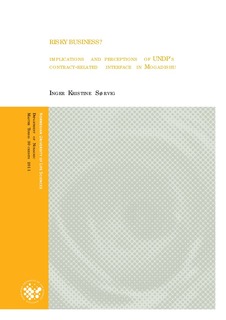| dc.description.abstract | The last few years the UN has witnessed an increase in criticisms regarding their interactions in Somalia. The criticisms need to be coupled with the broadened understanding and activities of peace-building, and the integration of development as part of this venture. In an attempt to meet these criticisms, the UN has developed an accountability framework which they seek to adhere to.
Further, UN’s development agency for Somalia (UNDP) has, due to the security situation in Somalia’s capital Mogadishu, had to withdraw their staff and now manage their implementing partner businesses and organizations from their safe offices in Nairobi. The study seeks to explore the risks and implication related to this mode of operation and takes use of existing literature which is critical to the liberal peace-building project to identify potential consequences of their contract-related interference in Mogadishu.
An understanding of the implications of UNDP’s contracting has been advanced by comparing and contrasting the insights and perceptions obtained from various actors involved with their activities in Mogadishu. The study argues that UNDP have a limited control over the risks related to their contracts and the outcome of their projects, as well as of the implications of the way they interact in Mogadishu. Findings suggest there is limited competition for the contracts when they are played out in the Mogadishu context which works to favor the big actors; that there are big benefits and powers in being contracted which can potentially influence the position of the contracted actor; and further that there is a lack of transparency into UNDP’s contracted partners which have implications for local Somali’s perception of the agency. Moreover, control over the implementation, quality and impact of the projects is suggested to be put at stake by UNDP’s lack of presence on the ground as well as control over who is benefiting from their finances. The findings indicate that there are risks that UNDP’s projects will have damaging effect where they are implemented, that actors will take advantage of their funding for their own benefit and that UNDP’s contract-related interface in Mogadishu have implications for their accountability towards the Somali recipients and for the perception local Somalis have of the agency and their work.
The thesis concludes that UNDP’s mechanisms fail to produce a controlled outcome along the lines of their accountability framework. | no_NO |
